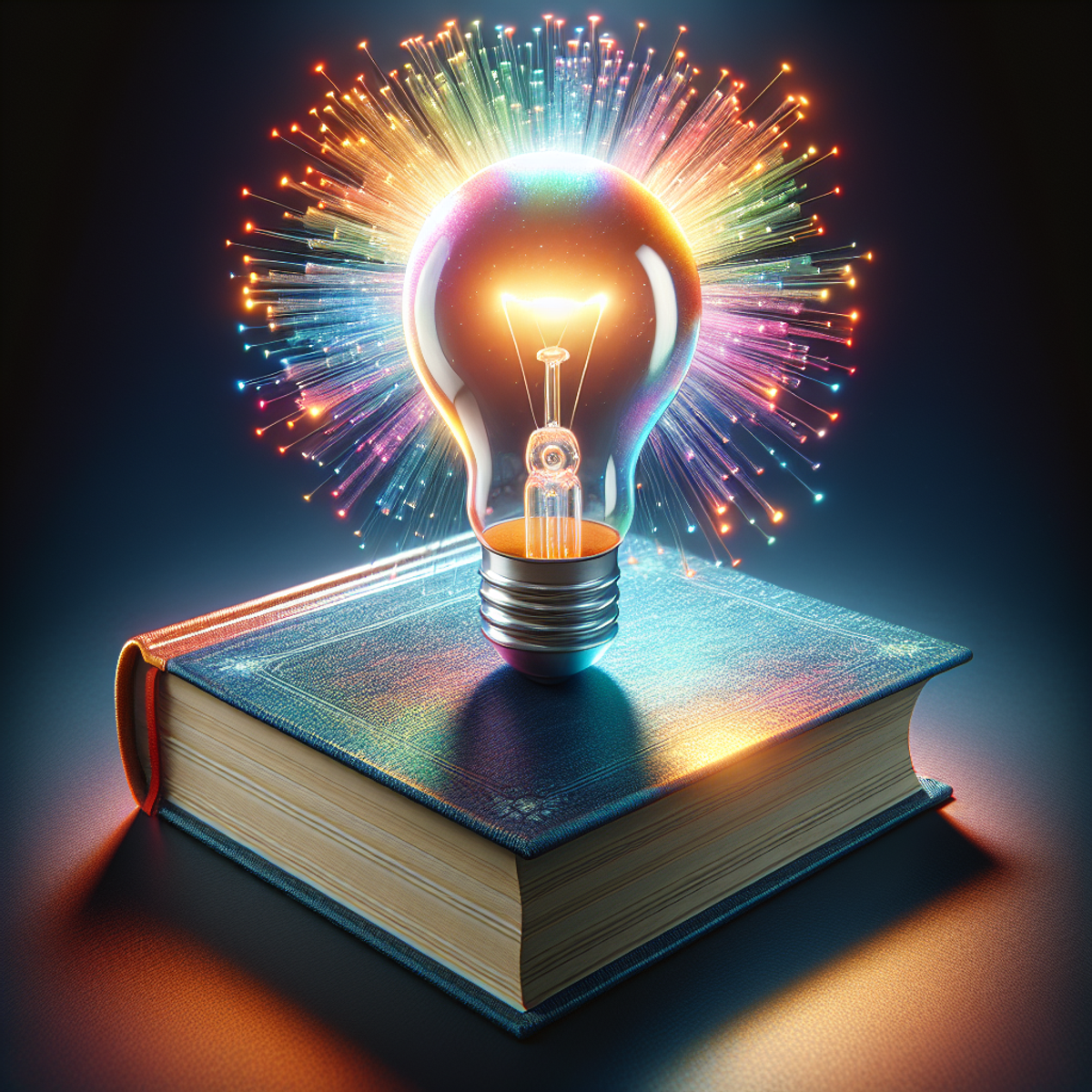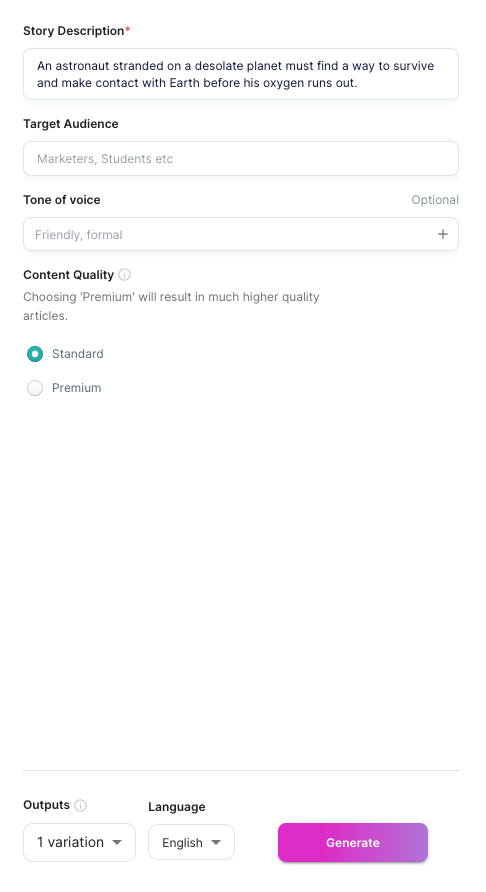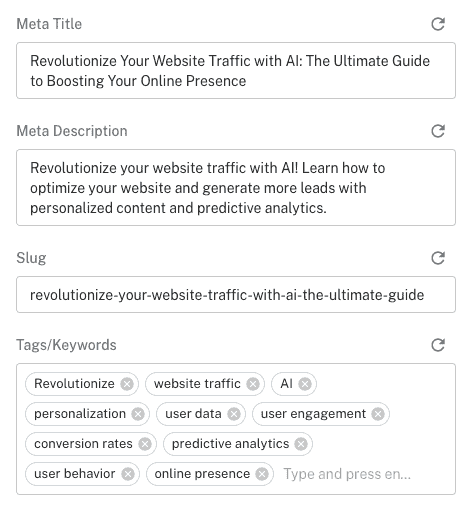AI Story Generator: The Ultimate Tool for Crafting Compelling Narratives

Introduction
AI story generators are becoming really popular in the writing community. They offer a fresh and creative way to create stories. These content generator tools use artificial intelligence (AI) to generate unique and original stories based on user input.
AI story generators use complex algorithms and machine learning techniques to analyze keywords, themes, and user preferences. Based on this analysis, they generate a variety of potential story ideas, providing writers with a wide range of inspiration for creating new and unique concepts.
AI story generators are appealing because they can help writers overcome creative blocks and provide fresh perspectives. With just a few clicks, writers can access a wealth of ideas to develop into captivating narratives.
These tools leverage artificial intelligence technology to produce narratives that are not only intriguing but also diverse. Whether you're looking for horror stories, funny tales, fantasy adventures, or mysteries to unravel, AI story generators can cater to a wide range of genres and interests.
Understanding AI Story Generators
AI story generators use different methods to create stories using artificial intelligence technology. These tools can be helpful for writers looking for ideas, but it's important to know their limitations.
Predefined Templates
Some AI story generators use pre-made templates to create stories. These templates are usually based on specific types of stories like romance, mystery, or fantasy. The AI looks at the words and prompts given by the user and makes a story using the chosen template.
- Using templates can be good because they give you a structure to follow, but they can also limit your creativity.
- The stories made by these generators might seem like they were made using a formula and not have much depth.
- If you only use templates, your story might not be interesting or unique.
Machine Learning Algorithms
Other AI story generators use machine learning algorithms to create stories. These algorithms have been trained on lots of text, so they can learn patterns and make stories based on what users want.
- Using machine learning is good because it can give you more original ideas.
- The algorithms can look at many different texts and make plots that don't follow normal story rules.
- But even with this advantage, the stories might still have some problems.
- They might not make sense or be consistent all the way through.
It is essential for writers to view the ideas generated by AI as a starting point rather than a final product. While these tools can assist in generating ideas, it is ultimately the responsibility of the writer to craft a compelling story using their own abilities.
How to Use an AI Story Generator Effectively
AI story generators can be powerful tools for writers, providing a wealth of ideas and inspiration. However, to make the most of these tools, it's important to use them effectively and combine their output with your own creativity and storytelling techniques. Here is a step-by-step guide on how to effectively utilize an AI story generator in your writing process:
1. Brainstorming with AI Story Generators

- Begin by inputting relevant keywords or themes into the AI story generator. These can be specific genres, settings, or character types that you want to explore in your story.
- Use the generated ideas as a starting point for brainstorming. The AI story generator can provide you with unique concepts and plot elements that you may not have considered before.
- Don't be afraid to experiment with different combinations of ideas. Mix and match generated concepts to create something truly original and unexpected.
2. Developing Characters
- While AI story generators can provide you with basic character profiles, it's important to flesh out these characters further to make them more engaging and relatable.
- Use the generated character descriptions as a foundation, but add your own personal touches to make them unique. Consider their motivations, flaws, and relationships with other characters.
- Give your characters depth by exploring their backstories and experiences. This will help you create well-rounded individuals that readers can connect with.
3. Leveraging Strengths and Mitigating Limitations
- Understand that AI story generators excel at generating ideas and concepts, but they may not always provide fully developed plots or cohesive narratives.
- Use the generated ideas as building blocks rather than relying on them exclusively. Combine them with your own storytelling techniques to craft a compelling narrative.
- Be prepared to edit and refine the output from the AI story generator. While it can provide valuable inspiration, it's important to make the story your own by adding your unique voice and style.
4. Combining Creativity and Storytelling Techniques
- Use the AI-generated ideas as a springboard for your own creativity. Expand on the concepts, add plot twists, and introduce new elements that align with your vision for the story.
- Incorporate storytelling techniques such as foreshadowing, suspense, and character development to enhance the narrative. These techniques will help you create a more engaging and immersive reading experience.
- Remember that the AI story generator is a tool to assist you in your writing process. It should not replace your own creativity or writing skills. Use it as a source of inspiration and guidance, but ultimately, trust your instincts as a writer.
By following these steps, you can effectively use an AI story generator to generate ideas, develop characters, and enhance your storytelling skills. Embrace the opportunities presented by these tools while staying true to your own unique voice as a storyteller.
The Ethics of Using AI for Storytelling
AI story generators offer a powerful tool for writers, students, and artists to generate creative ideas and overcome writer's block. However, it is essential to consider the ethical implications of using these tools to ensure that originality and proper credit are maintained. Here are some key points to consider:
1. Maintaining Originality and Attribution
When using AI story generators, it is crucial to remember that the generated ideas and content are not original works. While these tools can provide inspiration and help with brainstorming, the responsibility lies with the writer to transform those ideas into unique narratives using their own creativity and writing skills.
Attributing credit to human authors is also essential. If an AI story generator is used as a starting point or a source of inspiration, it is important to acknowledge its role in the creative process while giving due credit to the writer for their contribution in shaping the final story.
2. Responsible Use as Aids, Not Replacements
AI story generators should be seen as aids rather than replacements for creativity. These tools can assist in generating ideas, developing characters, and overcoming writer's block. However, relying solely on AI-generated content without incorporating personal creativity may lead to generic or formulaic stories lacking depth and originality.
Writers, students, and artists should use AI story generators as a starting point or a source of inspiration while adding their unique perspective, voice, and storytelling techniques. By infusing their own creativity into the generated ideas, they can create narratives that truly reflect their individual style and vision.
3. Ethical Considerations in Plagiarism Detection
AI story generators raise concerns regarding plagiarism detection. While these tools can help generate ideas, it is important for writers to ensure that the final story does not infringe upon existing copyrighted works or closely resemble content created by others.
Writers should utilize plagiarism detection software or conduct thorough research to ensure that their work is original and does not violate copyright laws. AI story generators should be used responsibly, with a focus on creating original and unique narratives that respect the intellectual property of others.
4. The Role of Creativity and Human Touch
While AI story generators have the potential to streamline the creative process, it is important to recognize that they cannot replicate the depth of human imagination, emotions, and experiences. These tools lack the ability to understand complex themes, cultural nuances, and personal perspectives that make stories truly compelling.
The human touch in storytelling is irreplaceable. Writers possess the ability to bring their unique life experiences, emotions, and insights into their narratives. AI story generators can serve as valuable tools, but they cannot replace the artistry and authenticity that comes from human creativity.
Conclusion
AI story generators can help with generating ideas, brainstorming, and overcoming writer's block. However, it's important to remember that these tools are meant to assist and not replace your own creativity and storytelling skills.
Here are some key points to remember:
- Embrace the opportunities presented by AI story generators: These tools can inspire you and lead to new ideas that you may not have thought of on your own. They can help you discover interesting plot twists or character traits that enhance your storytelling.
- Stay true to your own unique voice: While AI story generators can provide suggestions, it's crucial to infuse your personal creativity into the narrative. Use the generated ideas as a starting point and then shape them with your own storytelling techniques and style.
- Junia AI's story generator: If you're interested in exploring the latest advancements in narrative generation technology, Junia AI is an excellent choice. It offers innovative features and a user-friendly interface, making it one of the best options available.
